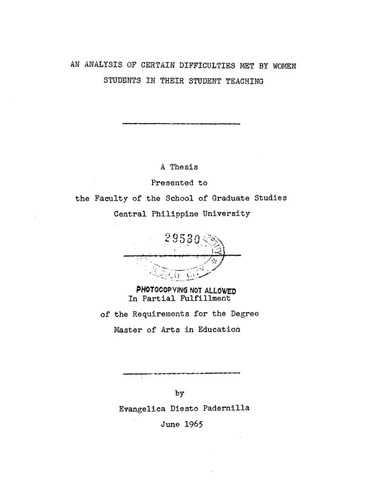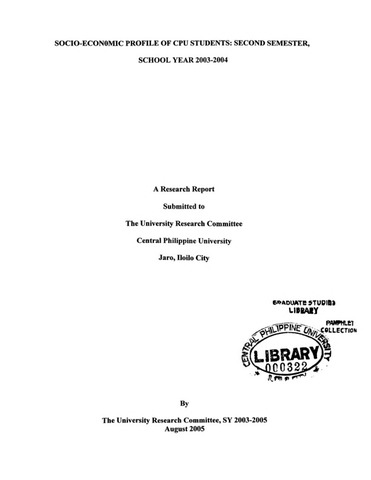| dc.contributor.adviser | Herradura, Elma S. | |
| dc.contributor.author | Padernilla, Evangelica Diesto | |
| dc.date.accessioned | 2022-03-25T05:50:38Z | |
| dc.date.available | 2022-03-25T05:50:38Z | |
| dc.date.issued | 1965 | |
| dc.identifier.citation | Padernilla, E. D. (1965). An analysis of certain difficulties met by women students in their student teaching (Unpublished Master’s thesis). Central Philippine University, Jaro, Iloilo City. | en_US |
| dc.identifier.uri | https://hdl.handle.net/20.500.12852/2003 | |
| dc.description | Introduction | en_US |
| dc.description.abstract | The need today for strengthening the teacher training program is greater because of the great demand for well-prepared teachers who can keep abreast of the rapid advancement of educational instructions. The time is past when a teacher who did not have much education and training could handle a class and teach it well enough to everybody's satisfaction. Now, with the present complexities of life, a teacher is expected to be competent. He must control a broad area of subject matter. He should learn modern methods and techniques of teaching. Above all, he has to acquire abilities and skills that will help him meet the challenge of an ever changing society.
There is a growing concern about the quality of teachers, for parents are seeing more and more clearly that the success of their children generally depends on the kind of education they get. One can hardly open an educational magazine these days without finding some article or speech about the responsibility of teachers; and it seems as though the world is to be saved or lost by the teachers and the results of their teaching of the boys and girls in their classrooms.
To some extent, this statement is true, for a teacher's influence upon the children under his care cannot be overestimated. In discussing the importance of teachers, a report from the Commission on Teacher Education says in part:
"Teachers are the key element in most educational processes. Upon their quality more than on any other factor depends the quality of instruction offered in the schools, the colleges, the universities, and the educational institutions provided for adults. And that quality is largely determined by the excellence of arrangement provided for the education of teachers. Such arrangements are not at present satisfactory."
This realization of the importance of quality teachers and the need for providing an excellent program for the education of teachers is a challenge to any teacher training institution. The students who intend to become teachers some day must be given intensive training if they are to be prepared to meet the challenge of their times.
One of the most valuable and profitable phases of the professional education of a prospective teacher is practice teaching. Grim and Michaelis, in support of this statement, wrote:
"A high point in the pre-service education of all teachers is the student teaching experience. Research related to the effectiveness of teacher education courses usually has placed student teaching at the top of the list. Informal evaluation including the reminiscences of teachers, confirms the findings of the more scientific studies."
It is in practice teaching where a student acquires mastery of techniques and skills in preparation for service in schools. All that he has learned in the college classrooms about the purposes of education, the principles of learning, what to teach in each subject field, and the various methods to use in teaching are tied down and put to use in a practical manner. He has learned as much as he can through vicarious experience. Practice teaching further helps a student make the transition between work in college classrooms and work as a full-fledged independent teacher.
Statement of the problem. Carefully trained teachers usually tend to be successful. It is believed that there is a great carry-over of practice teaching abilities to professional teaching. In Wiggins' The Student Teacher in Action, a question was asked, "Is student teaching really a good prediction of how successful you will be as a beginning teacher?" This was answered in the following paragraph:
"Although there are notable exceptions to this notion, it seems generally to be a reliable one. Exceptions stem from such factors as the difference in teaching situations themselves, the difference in what people conceive successful teaching to be, and the difference in the kinds of help you get, or don't get, as a beginning teacher."
The above statements imply that there seems to be a close correlation between the quality of a student's work in the training department and the degree of his efficiency as a teacher later on. Therefore, as a student teacher, he must already possess the personality traits and characteristics that distinguish a good teacher. He must have knowledge and understanding that will make him a master of his subject matter. He must have the attitude and interest that will make him strive hard to improve himself for the benefit of the children under his teaching and guidance. He must have acquired skills and abilities that will make his teaching most effective. In other words, he must somehow show a high level of competence in his teaching, even as a student.
Doctors cannot help their patients very well without diagnosing their illness. Similarly, educators cannot be of much help to the students without first knowing their difficulties. While a number of these problems have been pointed out by careful observers, there seem to be only a few studies based on the opinions of student teachers themselves. Therefore, it was deemed necessary that data representing opinions of student teachers be collected objectively as a basis for the identification of the real problems that are met by the students in their practice teaching.
This study, therefore, aims to answer the following questions:
1. What are the most difficult problems met by students in their practice teaching?
2. What are the probable causes of these problems?
3. How can the students be helped in overcoming these problems? | en_US |
| dc.format.extent | 110 leaves | en_US |
| dc.language.iso | en | en_US |
| dc.subject.ddc | GSL Theses 378.242 P132 | en_US |
| dc.subject.lcsh | Student teachers | en_US |
| dc.subject.lcsh | Student teachers--Training of | en_US |
| dc.subject.lcsh | Student teaching | en_US |
| dc.subject.lcsh | Student teaching--Evaluation | en_US |
| dc.subject.lcsh | Women | en_US |
| dc.title | An analysis of certain difficulties met by women students in their student teaching | en_US |
| dc.type | Thesis | en_US |
| dcterms.accessRights | Not publicly accessible | en_US |
| dc.description.bibliographicalreferences | Includes bibliographical references | en_US |
| dc.contributor.chair | Nelson, Linnea A. | |
| dc.contributor.committeemember | Catedral, Alfredo P. | |
| dc.contributor.committeemember | Revicencio, Patria J. | |
| dc.contributor.committeemember | Sornito, Juan E. | |
| dc.contributor.committeemember | Ruiz, Macario B. | |
| dc.contributor.committeemember | Gonzales, Julia D. | |
| dc.contributor.committeemember | Porter, Josefina Y. | |
| dc.contributor.department | School of Graduate Studies | en_US |
| dc.description.degree | Master of Arts in Education | en_US |
| local.relation.associatedcontent | https://repository.cpu.edu.ph/handle/20.500.12852/2739 Journal article published in Southeast Asia Quarterly | en |





